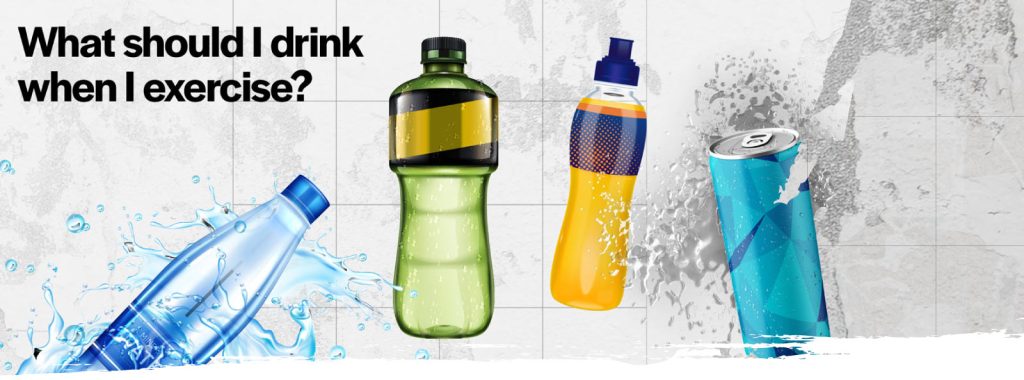Many different kinds of sport drinks promise miracles. Let’s check the facts!
Fluids while exercising – the science
Allowing muscle fibres to contract: Your muscles work thank to the “sliding” of interlaced fibres, actin and myosin. Water, alongside some minerals, is a key element for this to happen*. If there is scarcity of water in your body (dehydration), the process is inhibited.
Regulating body temperature: Water has an active job in thermoregulation. The first example is of course sweat. Sweating cools down our skin from the outside, as well as regulating the concentration of salt in our blood. In warm weather, during prolonged exercise, sweat can account for as much as 5 to 10 litres!** But that’s not the only way water maintains the right temperature. In fact, thanks to capillaries (the tiny little blood vessels which are close to the surface of the skin) our body manages to cool down the blood and by extension the whole body.
Continuation of normal processes: even though your mind is focused on your activity, your body runs many other processes in the “background” that still require a fair amount of water. Exercise pushes up your body’s demand for water, but denying other organs fluid can have serious consequences***.
What should I drink when I exercise?
I could conclude the blog with two words: plain water. We are made of it. There are no drawbacks in drinking water, only positives. It’s readily available and don’t wait until you’re thirsty! The feeling of thirst is conditioned by habit, gender, etc. Thirst doesn’t always correspond to the current status of hydration of the body, so pre-empt it with frequent intake.****
There are big claims for the wider choice of drinks available though!
Caffeinated drinks:
Caffeine is the most used psychoactive drug in the world. It stimulates the central nervous system by tricking it. It stops a substance which is naturally produced by your body, adenosine, from binding to your cells. This is how adenosine helps your daily cycle: It gradually builds up during the day, until you feel relaxed and ready to sleep. While sleeping, you get rid of it and the cycle repeats. If you are an attentive reader you can already spot a major flaw of caffeine here! I never said that caffeine stops the production of adenosine, it only stops it from getting to the place it is meant to. Therefore it keeps building and building until our body flushes caffeine away and then boom, we find ourselves with a great quantity of free adenosine which gives us the “caffeine” crash*****. So, it basically only delayed your sleepiness.
But when the effect is in place, does caffeine make me better at sports? Until 20 years ago caffeine was a banned substance from the World Anti-Doping Association (WADA), alongside terrible stuff like cocaine, anabolic steroids and hGH******. It’s just that the wide use of caffeine made it impossible to supervise. So yes, it does work, but not equally for every sport. It works best for endurance athletes: Road cycling, long distance running, soccer. These are a few examples of where the caffeine works at its best by inhibiting fatigue. For every other sport, the only effect is slightly higher alertness*******.
Is caffeine safe to drink? Many studies speak in favour of moderate intake. The problem arises when high-concentration “energy drinks” or caffeine pills are consumed. In that case, look out for side effects like addiction, mild withdrawal syndrome, reduced focus (when not on caffeine) and increased risk of diabetes and anxiety********.
Carbohydrate drinks:
They are grouped as hypotonic, isotonic and hypertonic. Big words which only mean their concentration of carbohydrates relative to what’s in your blood already. (Hypo = less, iso = same, hyper = more). The difference is the speed of absorption. Hypotonic, less concentrated drinks are quickly taken up, flowing through your blood stream ready to be used. It obviously means that there are fewer carbs, and therefore less energy (calories) in them. Which brings us to the next point: do we need sugar while exercising? Because it is definitely sugars we are talking about in those drinks! To make it really simple, assuming we are following a balanced diet, we already have all the energy we need to start our activity, therefore drinking it beforehand is pretty much useless*********.
The exception is prolonged and/or intense activity. Sipping a beverage containing quickly absorbable energy can prevent a dive in performance. Avoid huge amounts at once which can upset your stomach. Avoid brands that use fructose, for pretty much the same reason. And you don’t need branded drinks to absorb electrolytes, the minerals that are expelled through heavy sweating. Your ordinary mineral water is already more than likely to contain electrolytes. Do carb drinks have any drawback? Only for your teeth (any quantity) and for your weight and blood pressure (when taken in big quantities) We only need few grams of sugar (in any form) and only when under fatigue, to replenish the reserves of glycogen in muscles. Drinking a litre of Lucozade while sitting at your desk is bad for your weight, your teeth, your blood pressure ….*********.
Protein drinks:
Drinking protein shakes before exercising will NOT increase performance. It might even upset our gut and make our daily activities unpleasant. However, protein drinks are said to promote muscle growth. Here is where the confusion lies: it is not the drink that promotes it, but the fact that you are exercising! After your session is completed, don’t rush for your shake! Perhaps have a shower, a little chat with your teammates or gym buddies, and then eat a healthy snack containing a good amount of protein. It pretty much doesn’t even matter what the source is (animal, plant, dairy, eggs)! It is understandably practical to use supplements to top up your daily intake, but make sure you don’t exceed the guidelines of 1.4-2.0 grammes of protein per kilogramme of bodyweight each day. And this counts for very active people. If you are only recreationally exercising, you should be at the lower limit or slightly below**********. A daily protein intake high enough to sustain and promote healthy muscle to strengthen is essential, but if it is too much our body will initially discard them, then starting to store them as fat.
In conclusion
If your body is on point before even starting exercising, you are already a step ahead. When it comes to performance, as very often happens in life, it is all about moderation – all results have trade-offs. Water is always safe and efficient, and it will always hydrate you. If you want to use a different kind of drink, keep your intake moderate. In hot weather, if you can source chilled drinks then do***********. If you’re training outdoors for a length of time, consider packing half-frozen water bottles to help regulate your body temperature.
References
* & *** Bernadot, D. (2011) Advanced sport nutrition. 2nd Edn. Champaign: Human Kinetics.
** Gisolfi C. V.(2003) ‘Nutritional needs in hot environments: applications for military personnel in field operations.’, US Committee on military nutrition research.
****Cheung S. S., McGarr G. W., Mallette M. M., Wallace P. J., Watson C. L., Kim I. M., Greenway M. J. (2015) ‘Separate and combined effects of dehydration and thirst sensation on exercise performance in the heat.’ Scandinavian Journal of medical sport science, 25(1), 104-111.
*****Cooper, C. (2012) Run, swim, throw, cheat: the science between drugs in sports. Oxford: Oxford University Press.
******WADA (2019) Prohibited List [online]. Available from: https://www.wada-ama.org/sites/default/files/prohibited_list_2018_en.pdf [31st Jan 2021]
*******Goldstein, R. E., Ziegenfuss, T., Kalman, D., Kreider, R., Campbell, B., Wilborn, C., Taylor, L., Willoughby, D., Stout, J., Graves, B., Wildman, R., Ivy, L. J., Spano, M., Smith, E. A., Antonio, J. (2010) ‘International society of sports nutrition position stand: caffeine and performance’. Journal of the International society of sports nutrition, 7, 5-20.
********van Dam R. M., Hu F. B., Willett W. C. (2020) ‘Coffee, caffeine and health.’ New England journal of medical science, 383, 369-378.
********* Cohen, D. (2012) ‘The truth about sports drinks’ British Medical Journal, 345, 1-8.
**********Campbell B., Kreider R. B., Ziegenfuss T., La Bounty P., Roberts M., Burke D., Landis J., Lopez H., Antonio J. (2007) ‘International Society of sports nutrition position stand: protein and exercise.’ Journal of the International society of sports nutrition, 4(8).
***********Mundel T., King J., Collacott E., Jones D. A. (2006) ‘Drink temperature influences fluid intake and endurance capacity in men during exercise in a hot, dry environment.’ Journal of Experimental Physiology, 91(5), 925-933.





